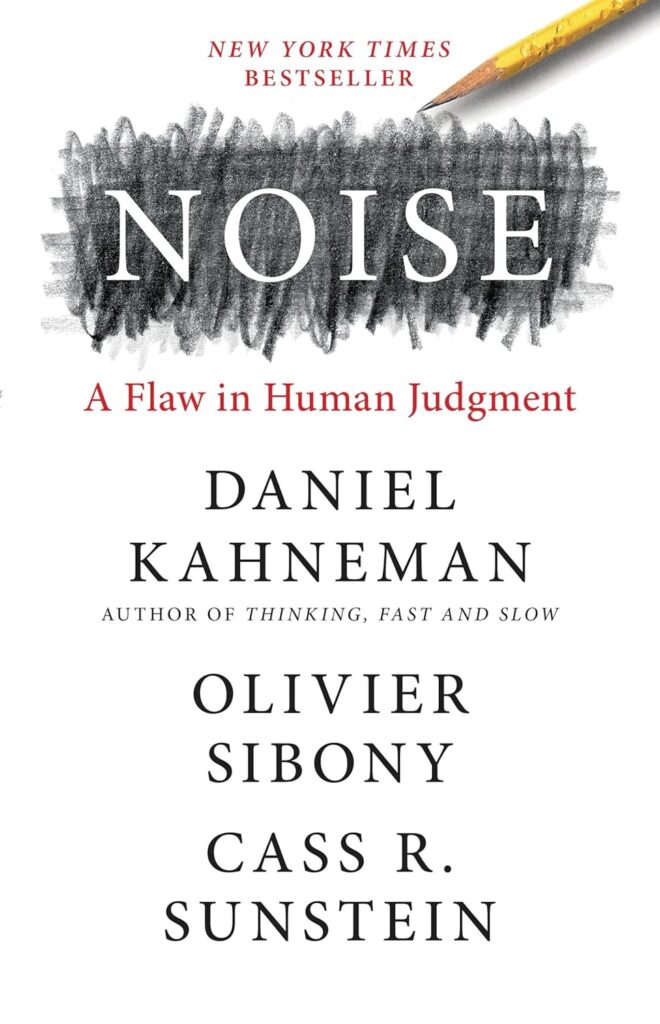|
Getting your Trinity Audio player ready...
|
Human judgment. We rely on it every day—whether it’s a doctor making a diagnosis, a judge handing down a sentence, or a manager deciding who to hire. We like to think that these judgments are fair and consistent, guided by experience and expertise. But what if that confidence is misplaced?
This is exactly what Daniel Kahneman, along with co-authors Olivier Sibony and Cass Sunstein, unpacks in their compelling book, Noise: A Flaw in Human Judgment. It’s an eye-opening exploration of a subtle yet pervasive problem in decision-making: noise.
The Hidden Fog in Human Decisions
So, what is noise?
Kahneman and his colleagues define it as random variability in judgments where consistency is expected. Think of two doctors giving different diagnoses for the same symptoms. Or two judges handing out starkly different sentences for similar cases. Or two recruiters offering conflicting assessments of the same candidate.
Unlike bias, which skews judgments predictably in one direction, noise is chaotic. It’s the hidden fog clouding our decisions—harder to spot than bias but equally damaging.
This realization hit me hard. Bias feels tangible—like a visible flaw in the system. But noise? It’s insidious. It lurks beneath the surface, quietly distorting outcomes and eroding trust in the fairness of systems we depend on.
Why Should We Care About Noise?
The book doesn’t just identify the problem—it illustrates its real-world consequences across industries:
- Healthcare: Noise leads to unnecessary treatments or missed diagnoses. One doctor’s “life-threatening condition” might be another’s “nothing to worry about.”
- Judicial Systems: Inconsistent sentencing for similar crimes undermines faith in fairness and equality under the law.
- Hiring: Noise in job interviews and evaluations results in inefficiencies, poor hires, and lost opportunities.
For someone like me, who’s fascinated by the intersection of psychology, technology, and systems improvement, this was a wake-up call. Noise isn’t just an academic concept; it’s a silent saboteur, corrupting the decisions that shape lives, careers, and communities.
What Can We Do About It?
The beauty of Noise lies in its practicality. The authors don’t just leave us with the bad news—they provide a toolkit to combat noise, which they call decision hygiene. Think of it as the mental equivalent of washing your hands: simple practices that make a world of difference.
Here are three strategies that stood out to me:
- Structure Decisions: Break complex decisions into smaller, objective steps. For example, structured interviews with standardized questions and scoring can minimize subjective judgments in hiring.
- Aggregate Independent Opinions: Instead of relying on one person’s judgment, collect input from multiple sources and combine them. This reduces the impact of individual variability.
- Leverage Technology: Algorithms and data-driven tools, when used thoughtfully, can significantly reduce both bias and noise.
These strategies aren’t just theoretical; they’re actionable. And the results can be transformative.
My Personal Takeaway
Reading Noise felt like peeling back a layer of reality I hadn’t questioned before. It made me more aware of how my own decisions—big or small—are influenced by noise. How often do I make choices swayed by my mood, energy levels, or circumstances?
The book pushed me to think about the systems I can build in my own life to reduce inconsistency. Whether it’s using checklists for decision-making or relying on tools that bring structure to chaos, I’ve started making changes.
Why Noise Matters in a Digital World
In today’s increasingly automated world, this book feels especially timely. We’re surrounded by algorithms and AI systems designed to make decisions for us. While they aren’t perfect, Noise highlights how human judgment, too, is deeply flawed—and why we need to design systems that reduce both bias and noise.
This isn’t just about improving efficiency. It’s about fairness, trust, and making decisions that stand up to scrutiny.
Ready to Explore the Hidden Flaws in Judgment?
If you’re someone who values fairness, consistency, or simply wants to make better decisions, Noise is a must-read. It’s not just a book; it’s a call to action—a guide to improving the way we think, decide, and create systems.
Have you read Noise? Or thought about how variability affects your own decisions? I’d love to hear your reflections in the comments below. Let’s keep the conversation going—and maybe, just maybe, make the world a little less noisy.

